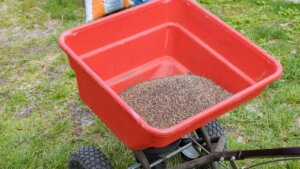Maintaining a beautiful yard is a crucial part of homeownership. Lawn mowing plays a significant role in this process.
But what happens when your lawn mower refuses to start? This guide will walk you through the common reasons why your lawn mower might not start and provide quick fixes to get you back to mowing your lawn in no time. It’s worth reading because it will save you time, money, and the frustration of dealing with a stubborn lawn mower.
What Could Be the Common Reasons Your Lawn Mower Won’t Start?
There are several common reasons why your lawn mower might not start. These include issues with:
- the spark plug,
- carburetor,
- air filter,
- ignition system,
- fuel system.
Understanding these common problems is the first step toward troubleshooting your lawn mower’s starting issues.
For instance, a dirty mower deck can hinder the blade from turning, preventing the lawn mower engine from starting. Similarly, grass clippings stuck in the wrong places can also cause starting issues.
How to Fix a Lawn Mower That Won’t Start: Is It the Spark Plug?
One of the most common reasons a lawn mower won’t start is a dirty or worn-out spark plug.
If your lawn mower has been running rough or consuming more fuel than usual, it might be time to check the spark plug. Cleaning or replacing the spark plug can often fix the problem and get your lawn mower running again.
The spark plug is responsible for igniting the fuel in the engine. If it’s dirty or worn out, it may not be able to ignite the fuel properly, leading to starting issues.
Could a Clogged Carburetor Be the Culprit of Your Lawn Mower’s Starting Issues?
A clogged carburetor is another common reason for a lawn mower that won’t start. Old gasoline left in the mower can gum up the carburetor and prevent the engine from starting. Cleaning the carburetor or using a carburetor cleaner can often resolve this issue.
Sometimes, you may need to remove the carburetor to clean it thoroughly. After cleaning, make sure to reinstall it properly to avoid any further issues.
Is a Dirty Air Filter Preventing Your Lawn Mower from Starting?
A dirty air filter can restrict airflow to the engine, causing the lawn mower to run poorly or not start at all. Regularly cleaning or replacing the air filter can prevent this issue and ensure your lawn mower starts when needed.
If your lawn mower emits black smoke, it could be a sign that the air filter is clogged and needs cleaning or replacing.
How to Troubleshoot Ignition System Problems in Your Lawn Mower
Ignition system problems can also prevent your lawn mower from starting. These can include issues with:
- the spark plug wire,
- ignition coil,
- ignition switch.
Troubleshooting these components can help you identify and fix the problem. For instance, if the lawn mower’s engine doesn’t start, check if the flywheel brake is releasing correctly. If not, it could prevent the flywheel from spinning and the engine from starting.
Is Your Lawn Mower’s Fuel System Causing the Starting Problem?
Problems with the fuel system, such as a clogged fuel line or a dirty fuel filter, can prevent your lawn mower from starting. Checking these components and ensuring they are clean and functioning properly can often resolve starting issues.
It’s also important to check the fuel tank. If it’s empty or the fuel is stale, your lawn mower won’t start. Using a fuel stabilizer can help keep the gasoline in your mower fresh, especially during the off-season.
How to Fix a Lawn Mower That Won’t Start: Briggs and Stratton Edition
The troubleshooting process is similar if you have a Briggs and Stratton lawn mower. Check the spark plug, carburetor, air filter, ignition system, and fuel system. These are common areas where issues arise in Briggs and Stratton lawnmowers. In some cases, you may need to replace the starter rope if it’s worn out or broken.
Lawn Mower Won’t Start: When to Call a Professional
While many lawn mower starting issues can be resolved with some DIY, there are times when it’s best to call a professional. If you’ve tried troubleshooting and your lawn mower still won’t start, or if you’re uncomfortable performing these checks and fixes yourself, it might be time to call a pro. This is especially true for more complex issues, such as problems with the riding lawn mower’s engine or the flywheel.
A professional can also help if you see black smoke from your mower, indicating a more serious issue.
Preventing Future Lawn Mower Starting Issues: Maintenance Tips for 2023
Preventing future lawn mower starting issues involves regular maintenance.
This includes cleaning or replacing the spark plug and air filter, using fresh gasoline, and storing your lawn mower properly. Regular maintenance can keep your lawn mower running smoothly and prevent common starting issues. For instance, using a fuel stabilizer can prevent old gas in your fuel tank from gumming up the carburetor. Regularly cleaning the mower deck can prevent grass clippings from clogging up the system and causing issues.
Conclusion: Quick Fixes to Get Your Lawn Mower Running Again
In conclusion, while it can be frustrating when your lawn mower won’t start, several quick fixes can get it running again. These tips can help you troubleshoot and resolve common lawn mower starting issues, from checking the spark plug and carburetor to calling a professional.
Remember, regular maintenance is critical to preventing these issues from occurring in the first place. So, keep your mower clean, use fresh fuel, and don’t forget to check the spark plug and air filter regularly.
Brief Summary:
- Check the spark plug for dirt or wear and replace it if necessary.
- Clean the carburetor to remove any old gasoline causing a clog.
- Replace the air filter regularly to ensure proper airflow to the engine.
- Troubleshoot the ignition system if you suspect it might be causing the starting issue.
- Call a professional if you’re unable to resolve the issue yourself.
- Regular maintenance can prevent many common lawn mower starting issues.
- Use a fuel stabilizer to keep the gasoline in your mower fresh.
- Clean the mower deck regularly to prevent grass clippings from clogging the system.



